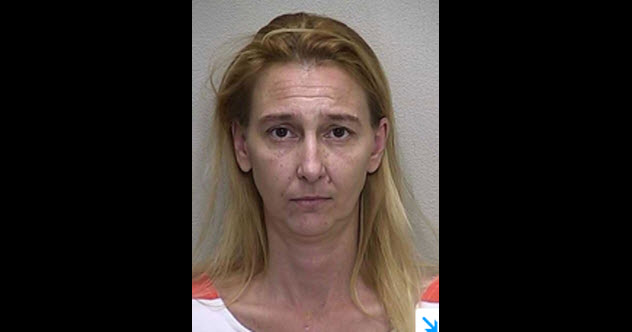 Our World
Our World  Our World
Our World  Crime
Crime 10 Dark Details of the “Bodies in the Barrels” Murders
 Animals
Animals The Animal Kingdom’s 10 Greatest Dance Moves
 Movies and TV
Movies and TV 10 Box Office Bombs That We Should Have Predicted in 2025
 History
History 10 Extreme Laws That Tried to Engineer Society
 History
History 10 “Modern” Problems with Surprising Historical Analogs
 Health
Health 10 Everyday Activities That Secretly Alter Consciousness
 History
History Top 10 Historical Disasters Caused by Someone Calling in Sick
 Animals
Animals 10 New Shark Secrets That Recently Dropped
 Movies and TV
Movies and TV 10 Forgotten Realities of Early Live Television Broadcasts
 Our World
Our World 10 Places with Geological Features That Shouldn’t Exist
 Crime
Crime 10 Dark Details of the “Bodies in the Barrels” Murders
 Animals
Animals The Animal Kingdom’s 10 Greatest Dance Moves
Who's Behind Listverse?

Jamie Frater
Head Editor
Jamie founded Listverse due to an insatiable desire to share fascinating, obscure, and bizarre facts. He has been a guest speaker on numerous national radio and television stations and is a five time published author.
More About Us Movies and TV
Movies and TV 10 Box Office Bombs That We Should Have Predicted in 2025
 History
History 10 Extreme Laws That Tried to Engineer Society
 History
History 10 “Modern” Problems with Surprising Historical Analogs
 Health
Health 10 Everyday Activities That Secretly Alter Consciousness
 History
History Top 10 Historical Disasters Caused by Someone Calling in Sick
 Animals
Animals 10 New Shark Secrets That Recently Dropped
 Movies and TV
Movies and TV 10 Forgotten Realities of Early Live Television Broadcasts
10 Nightmarish Breaches Of Trust By Health Care Professionals
It’s a question that has haunted the thoughts of countless hospital patients: Can I trust the professional who currently holds my life in his hands? In most cases, the answer is “yes.” But there are cases of wanton negligence and predatory opportunism by health care providers that could give even the most trusting patient a case of the health care heebie-jeebies.
10 A Doctor Encourages A Patient To Commit Suicide

Dr. Arun Singhal was a general physician at a hospital in Liverpool, England. In May 2011, he consulted on a case of a distraught woman who was on antidepressants. The woman, referred to as “Patient A,” was a witness for the prosecution in a rape case. After discovering that she lived close to the rape suspect’s brother, Patient A called Singhal for a sick note to absolve her from taking the stand. Terrified, she also admitted to being on the verge of suicide and said that her antidepressants weren’t working.
Singhal’s response to Patient A was more becoming of a sadistic Internet troll than a licensed lifesaver. He chided her as a “disgrace” of a patient and told the woman to “jolly well kill herself.” He even suggested that she consult the Internet for useful suicide tips. But as Singhal dispensed his decidedly unprofessional advice, he had no clue that Patient A was recording their conversation. Understandably upset, she filed a complaint.
The Medical Practitioners Tribunal Service looked into the matter and concluded that Singhal had likely taken Patient A’s claims too lightly and had behaved inexcusably. The doctor was subsequently suspended for three months. Considering the tragedy which might have happened if Patient A had followed the doctor’s orders, Singhal is lucky that he wasn’t fired.
9 A Vengeful Ex–Hospital Employee Sends Patients Fake Lobotomy Letters

From 2005 to 2010, Michelle Morrison of Elk Grove Village, Illinois, served as the senior account representative for Alexian Brothers Behavioral Health Hospital before being laid off. Feeling embittered and vengeful, she lashed out by stealing hospital stationery and the private information of more than 30 patients as part of a heartless plot to embarrass her former bosses.
From February 2011 to June 2012, Morrison sent six fraudulent letters to three Alexian Brothers patients claiming that their psychological treatments had failed and they would need to undergo frontal lobotomies. The letters also contained crude, debasing remarks and threats to reveal the patients’ medical information to their friends, family, and coworkers.
A two-month investigation uncovered Morrison as the culprit. Caught with patient files and other hospital materials in her home, she had little recourse but to plead guilty. Outwardly repentant, Morrison apologized in court for what was her first criminal offense on record. As punishment, she was placed on 30 months’ probation.
8 Nursing Home Employees Play Cruel Jokes On Dementia Patients

In 2010, at the Valley View Skilled Nursing Facility in Ukiah, California, six employees decided that it would be hilarious to cover seven defenseless dementia patients from head to toe with ointment to create a slippery challenge for the next shift of employees. But rather than having a hearty belly laugh, these cruel employees, aged 23 to 51 years old, were arrested.
Unfortunately, the Ukiah sextet are not the only perpetrators of cruel nursing home misconduct. In May 2012, an employee was dismissed from the UK-based Kirknowe Care Home after feeding a dog treat to a dementia patient as a joke. Nursing home employee Tracie Nellis also displayed sadistic behavior. In 2013, she deposited hot sauce into the mouths of two sleeping dementia patients, a misdeed for which she voluntarily relinquished her nursing license.
The list of similar and far graver offenses seems endless. All of them tell the too-common story of health care workers who take advantage of vulnerable patients.
7 A Doctor Slaps The Butts Of Sedated Patients
For at least a year, Dr. Michael T. Clarke, a physician at St. Joseph’s Hospital Health Center in Syracuse, New York, delighted in hearing the sharp thwack of his palm against the butt cheeks of his unconscious patients in the operating room. He would later try to pass off this behavior as a way to gauge the effectiveness of spinal anesthetics. But coworkers present in the operating room painted a different picture.
According to them, the slaphappy doctor spewed sexually explicit insults while striking his patients, sometimes using enough force to leave lasting red handprints. Allegedly, he also hurled raunchy comments at hospital staff. After months of remaining tight-lipped about Dr. Clarke’s shocking bedside manner, members of the OR staff finally alerted hospital administrators in December 2013.
A state health department investigation corroborated complaints against Clarke. He was suspended in February 2014 and required to take undisclosed steps to qualify for reinstatement. After eight months, he was back in the operating room at St. Joseph’s.
6 A Surgeon Sends Sexts Mid-Operation
A medical practitioner for 20 years, anesthesiologist Arthur K. Zilberstein was based at Swedish Medical Center in Seattle, Washington, when he committed his infractions. Across a variety of procedures—everything from caesarian sections to pediatric appendectomies—the doctor took the time to send nearly 250 sexually suggestive text messages and explicit photos to his girlfriend and sometimes his own patients.
In one instance, he sent a patient a selfie that showed him in hospital attire with his genitals dangling in plain view. During a stomach surgery, he sent 45 lusty texts in under 90 minutes.
Dr. Zilberstein has also been implicated in reviewing patients’ medical records for his own carnal pleasure, engaging in hospital romps, and doling out unauthorized prescriptions. Whether his indulgences ever injured anyone is unclear, but state officials felt that Zilberstein’s indiscretions warranted the suspension of his medical license. At that time, Swedish Medical Center also suspended the doctor’s privileges.
5 An Anesthetist Punches His Patient After Heart Surgery
Dr. Andrei Votyakov, an anesthetist at Russia’s Federal Center for Cardiovascular Surgery in Perm, had slogged through a 36-hour shift and reached the edge of his patience. According to Votyakov, it was in this compromised state that he encountered a recent heart surgery patient, who was wearing an oxygen mask and had both of his arms and legs strapped to the bed.
The 61-year-old patient allegedly insulted Votyakov and displayed zero appreciation for his work. At that point, the doctor jettisoned what little composure he had left and punched the man in the face before pounding on his fragile chest above the heart. The patient later died a week later.
Video footage of the interaction dated February 21, 2013, shows what looks like an argument between Votyakov and the patient before the doctor resorts to violence. The interaction was later posted online, which incensed the public and led to an official investigation. Votyakov apologized for his appalling display of malice but denied causing the patient’s death. The results of a criminal investigation into his behavior apparently supported his claim because the physician was reportedly fined 100,000 rubles and only sentenced to five months of community service.
4 A Nurse Steals From Sleeping Cancer Patients

In January 2015, officials at Morriston Hospital in Wales set out to catch a crook. Someone had been robbing patients since at least the previous November, and the staff believed one of their own was responsible. With the help of local law enforcement, they devised a trap: A marked £20 note was positioned under a plant pot as bait. Much to everyone’s relief, it worked. Much to their chagrin, the culprit was indeed a hospital employee, one who had exploited some of Morriston’s sickest patients.
That employee was 49-year-old nurse Jacqueline Perry, and she worked in Morriston’s cancer ward. Apparently, she waited for cancer patients to fall asleep before rifling through their things for valuables she could sell to fund her husband’s cider habit. The quality and quantity of her heists varied greatly. Perry stole painkillers, cash, and jewelry. In one instance, she lifted £14 from a cancer patient. Another patient, 89-year-old Nancy Thomas, was stripped of treasured family heirlooms—three rings valued at a combined £1,800—before she died. Perry sold those rings for about 10 percent of their value.
In total, Perry bagged £2,739 worth of personal belongings before she was nabbed in the hospital’s sting operation. According to the nurse, her capture was a relief from the guilt that had racked her conscience. For her crimes, Perry received a 16-month jail sentence. Unfortunately, some of her victims didn’t live long enough to see justice done.
3 A Doctor Secretly Records Patients’ Pelvic Exams
Gynecologist and obstetrician Dr. Nikita A. Levy worked at Baltimore’s renowned Johns Hopkins Community Medicine for 25 years. For at least eight of those years, he secretly wore a camera pen to clandestinely film the gynecological exams of his unsuspecting patients. Johns Hopkins learned of his behavior when a female colleague reported her suspicions about his pen in 2013.
The hospital brought in law enforcement, which found over 1,200 videos and pictures dating back to at least 2005. But during the 25 years that Levy had worked at the community clinic, he had seen a staggering 12,692 women who were deemed potential victims. The hospital had no choice but to inform all of them of the deep privacy violation.
Authorities found no tangible evidence that Levy recorded the women’s exams for anything more than private use, but that was traumatic enough for his victims. Some reported refusing to see doctors or take their children to doctors upon being informed of Levy’s abuses. A class action lawsuit was filed, and Johns Hopkins agreed to pay $190 million to over 7,000 of Levy’s former patients in compensation. Levy’s fate was far darker. Ten days after being outed for his crimes, he penned a letter of apology to his wife and killed himself with helium and a plastic bag.
2 A Drunken Anesthetist Accidentally Kills A New Mother

On September 26, 2014, Belgian-born Helga Wauters reported for duty at a private French clinic where she had been employed for two weeks. Although new to the facility, she’d been an anesthetist since 1994. No one would have been blamed for thinking that 28-year-old Xynthia Hawke was in good hands when she went into labor, and Wauters was tasked with supplying pain medication. Instead, Wauters tragically killed Hawke in a bout of drunken incompetence.
After Wauters gave Hawke an epidural, the anesthetist stepped out for a drink with friends. But labor difficulties made a caesarean necessary. The anesthetist now had to guide a tube into Hawke’s trachea in order to administer additional medication. But when Wauters returned to the clinic, she reeked of alcohol and, according to her colleagues, seemed off-kilter. Nonetheless, she was allowed to work. Wauters mistakenly placed the ventilation tube in Hawke’s esophagus, causing a heart attack. Hawke died four days later. Fortunately, her child survived.
As it turned out, Wauters had a serious drinking problem, a point punctuated by 17 empty vodka bottles that authorities found lying around her home. She admitted to drinking “a glass of rose” after giving Hawke the epidural as well as imbibing water-vodka mix the night of the procedure. The anesthetist also unconvincingly tried to excuse her drinking by claiming that alcohol diminished her faculties by 30 percent but helped to steady her hands. Tests by law enforcement showed that Wauters had almost five times the legal limit of alcohol in her system on the day after her fatal drunken bungle.
When Wauters was arrested, she was initially denied bail. But the court eventually relented, ordering Wauters to pay 50,000 euros in bail and forbidding her to leave France or practice medicine. She also had to enter a rehabilitation program.
1 Doctors Who Ditch Patients Mid-Surgery
At Community Regional Medical Center in Fresno, California, cardiac surgeon Dr. Pervaiz Chaudhry performed almost 350 bypass surgeries between 2009 and 2010, placing him among the top five heart surgeons in California based on total number of surgeries. But his heavy workload seemingly came at a huge cost: Chaudhry had a below-average patient survival rate for his state. Of course, that depressing statistic might also be the result of Chaudhry’s alleged inclination to abandon patients during operations.
A number of lawsuits accuse Chaudry of ducking out of the operating room without completing heart surgeries. In one incident, his hospital was fined $75,000 after he left a physician’s assistant to close up a patient’s chest while he attended a luncheon. The patient, 72-year-old Silvino Perez, suffered a myocardial infarction, and the resulting physical trauma left him in a persistent vegetative state. Chaudhry has denied these and other charges levied against him, but an investigation by California’s State Department of Health found that the heart doctor had recklessly endangered Perez. The outcomes of other claims are currently unknown.
Chaudhry’s not the only professional to sacrifice a patient at the altar of good eats. In 2012, an anesthesiologist and a nurse anesthetist at a Swedish hospital inadvertently killed a man with a lunch break. They were supposed to be removing a tumor from a 72-year-old man, but as soon as lunchtime hit, the doctor shoved off for chow. Fifteen minutes later, the head nurse anesthetist also succumbed to hunger and left.
A nurse from the orthopedic ward was asked to sub for the doctor-nurse duo. Unfortunately, she lacked the vital expertise to realize that the patient’s respirator was turned off and to respond when he suddenly started hemorrhaging. By the time the lunching doctor and nurse returned, their patient had been starved of oxygen for eight minutes. He later died of brain damage.







